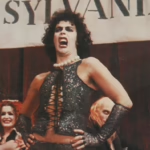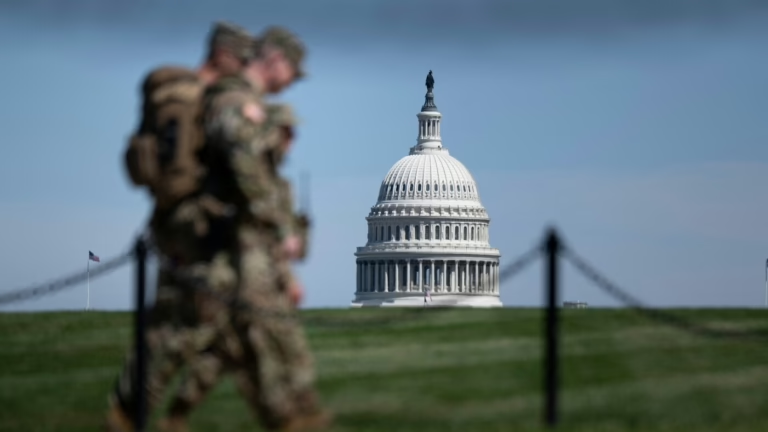National Guard troops are seen patrolling the National Mall in Washington, D.C. earlier this month. A recent NPR-Ipsos survey reveals that while Americans express concern about crime, there is limited support for President Trump’s strategy of deploying the National Guard in urban areas.
Brendan Smialowski/AFP via Getty Images
hide caption
toggle caption
Brendan Smialowski/AFP via Getty Images
A recent NPR-Ipsos poll highlights that although crime remains a pressing concern for many Americans, there is not widespread approval of President Trump’s decision to deploy National Guard units to patrol cities across the United States. The findings also underscore a pronounced partisan split regarding the president’s approach to combating crime.
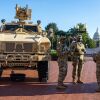
The continued deployment of National Guard forces in Washington, D.C. has sparked protests, and a federal court recently declared the troop presence in Los Angeles unlawful. Despite these setbacks, President Trump remains determined to extend this policy, citing it as a necessary measure to address rising crime rates. Memphis, Tennessee, has been announced as the next city to receive National Guard support.
“Due to the crime issues not only in Memphis but across numerous cities, we will address each one systematically, just as we did in D.C.,” Trump stated during a White House event.
He has also threatened to send troops to other Democratic-led cities such as Chicago, New Orleans, and Baltimore.
The NPR-Ipsos poll confirms that crime is a significant worry for many Americans.
“This concern is widespread,” explains Mallory Newall, vice president of the global polling firm. “Approximately 70% of Americans believe that crime and violence levels in urban areas have reached unacceptable heights.”
Although crime rates, including violent offenses, have dropped considerably from their peaks during the pandemic, public perception does not reflect this improvement.
“Most Americans feel that crime has escalated in the country and in major metropolitan areas,” Newall adds. “However, there is limited backing for measures like deploying the National Guard to combat these issues.”
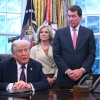
For example, nearly half of those surveyed oppose the idea of National Guard troops being stationed in their own city or a major urban area within their state.
Unsurprisingly, opinions on this issue are sharply divided along party lines.
“Around 80% of Republicans support such deployments, whereas a similar proportion of Democrats are against them,” Newall notes. “This reveals a clear partisan rift.”
This division is also evident in attitudes toward the ongoing National Guard presence in the nation’s capital.
“Their presence is purely symbolic and completely unnecessary,” says Les Blackmore, a Democrat and retiree from Lee’s Summit, Missouri, who was among the 1,020 individuals surveyed between September 19 and 21. The poll’s margin of error is ±3.2 percentage points.
Blackmore describes the Guard’s deployment as feeling like an occupation.
“Is this really the America we want to see? A national military force policing everyday life on our streets and highways?” he questions.
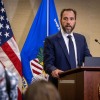
Republicans tend to be more supportive of Trump’s crime-fighting methods. The poll reveals that 93% of Republicans view crime and violence as unacceptably high.
Bianca Gallegos, a 35-year-old stay-at-home mother from Pocatello, Idaho, is among those who back the president’s approach.
“The biggest challenge America faces today is crime and drug-related issues,” she says. “There’s a lot of violence, drug problems, and gang activity.”
While Gallegos does not want the National Guard deployed in her own community, she supports their presence in Washington, D.C., and Memphis.
“Those two cities have serious crime problems,” she explains. “If President Trump believes this is necessary, then I agree it should be done.”
However, independents are less convinced. The NPR-Ipsos survey shows that over half of independents oppose the use of military forces to address crime.
“Although they recognize crime as an issue, they are uncomfortable with National Guard deployments in both major cities and their local areas,” Newall says.
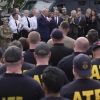
Darius Gamble, a 50-year-old human resources specialist from Gardendale, Alabama, identifies as an independent and criticizes the president’s use of the National Guard.
“Calling in the National Guard is an overreach and an abuse of presidential power,” Gamble asserts. “It’s unnecessary and unwarranted.”
He voted for Trump hoping for economic improvements and lower prices but feels the administration’s focus has been misplaced.
“Deploying military reserves doesn’t address the root causes, like the abundance of firearms on the streets or the lack of opportunities for individuals,” Gamble explains.
Economic concerns topped the list of worries in the NPR-Ipsos poll, followed by political division and then crime.
Newall notes that anxiety about political extremism and societal polarization has surged by roughly 15 percentage points since May.
“This indicates that the public is increasingly uneasy about the deep divisions and fractured political climate in the country,” she says.
These tensions are reflected in the contrasting views on the deployment of military forces to maintain order in American cities.


